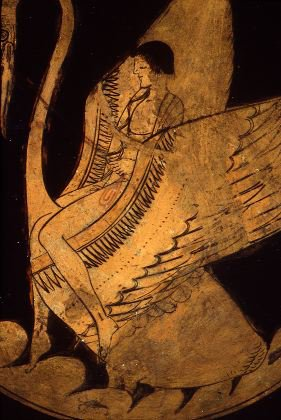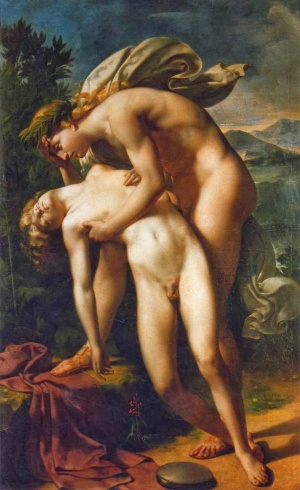(Boylove Documentary Sourcebook) - The Pederastic Ancient Greek Myth of Apollo and Hyacinthus as Depicted in the 'Metamorphoses' by Ovid: Difference between revisions
Replaced the redirect link with the new content of the page Tag: Removed redirect |
Added the page to the "Roman mythology" and "Greek mythology" categories |
||
| (One intermediate revision by the same user not shown) | |||
| Line 105: | Line 105: | ||
[[Category:Reference material on ancient Rome]] | [[Category:Reference material on ancient Rome]] | ||
[[Category:Reference material on ancient Greece]] | [[Category:Reference material on ancient Greece]] | ||
[[Category:Roman mythology]] | |||
[[Category:Greek mythology]] | |||
[[Category:Classical Latin literature]] | [[Category:Classical Latin literature]] | ||
[[Category:Boylove in literature]] | [[Category:Boylove in literature]] | ||
[[Category:Poetry]] | [[Category:Poetry]] | ||
Latest revision as of 07:32, 19 August 2021

From Homosexuality in Greece and Rome: A Sourcebook of Basic Documents, edited by Thomas K. Hubbard (Berkeley: University of California Press, 2003). Footnotes omitted.
This extract follows the previous one by a short interval, during which Ovid describes Orpheus’ loss of his beloved wife, Eurydice, and his futile attempt to recover her from the Underworld. Like Phanocles, Ovid credits Orpheus with the invention of pederasty and proceeds to tell several other pederastic myths.
[...]
Phoebus would have given you a home in the sky,
Amyclides, if the sad fates had allowed it.
Still, what was allowed was done: you are eternal;
Each year, when spring drives winter away, and Aries
watery Pisces, in the greensward
You rise up and bloom. My father loved you beyond
All others; he would abandon Delphi, the Earth’s
Midpoint, and go to spend time with you in Sparta,
The unwalled city by the river Eurotas.
He would neglect his cithara and his arrows, 170
Forget himself, carry hunting nets, handle dogs,
Accompany you along the jagged ridges
Of steep mountains; togetherness stoked his passion.
It was nearly noon: Titan had climbed to the point
That stands halfway between dawn and night’s arrival.
They shed their clothes; their bodies sleek with the unguent
Of the rich olive, they decided to contend
With the broad discus. Phoebus threw it first, sent it
Hurtling high into the air, slicing through the clouds.
Its flight was prolonged; it fell back to solid ground 180
Precisely; the god’s strength was united with art.
The Spartan boy, impelled by his zeal for the game,
Unknowing, rushed right out to retrieve the discus,
Which the hard earth shot straight back up, Hyacinthus,
Into your face. Apollo went white, no less than
The boy. He cradled your slackened limbs and warmed you,
Stanched your sad wounds, tried bringing your life back with herbs.
His arts were useless; the wound was incurable.
Just as, when someone snaps the stem of a violet,
Or of a poppy in a well-watered garden, 190
Or of lilies, with their long, bristling yellow tongues
—Unstrung, they let drop their suddenly heavy heads,
Unable to sustain their weight, and gaze towards earth—
In just this way your face turned downward as you died;
Your neck, its strength gone, became too great a burden,
Rolled sideways onto your shoulder. Phoebus cried out,
‘Descendant of Oebalus, cheated of your youth,
You’ve fallen, and I see that your wound is my crime.
You are my guilt and my sorrow; my own right hand
Must be inscribed with your death; I am the author
Of your demise. And yet, what was my great error? 200
Is it wrong to play? Can it be called wrong to love?
If only I could die for you, or die with you!
I’m bound by the laws of fate—but still, you’ll always
Be near me: you’ll be in my thoughts, and in my words;
My songs, the lyre strings I pluck, will tell of you,
And you will become a flower, my groans engraved
Upon you. The time will come when a great hero
will add himself to this bloom; his grief will be read
from the same petal.’ While Apollo prophesied
What was to come, the blood, which had stained the grasses, 210
Ceased to be blood, took on a deeper radiance
Than Tyrian dye, rose up, and assumed the form
Of a lily—except that it was not silver,
But purple. This was still not enough for Phoebus
(The author of the honor): he inscribed AIAI,
The text of his lament, on the flower’s petals;
The flower bears this funereal inscription.
Sparta was never ashamed of Hyacinthus,
Whose honor persists to this day: the annual
Hyacinthia and opening procession
Are celebrated in the ancestral manner.”

See also
- Adult friend (dictionary)
- Age of attraction (dictionary)
- Athenian pederasty
- Boylove
- Cretan pederasty
- Ephebophilia
- Eromenos
- Greek love
- Historical boylove relationships in ancient Greece
- Loved boy (dictionary)
- Minor-attracted person (dictionary)
- Pedophilia
- Philosophy of ancient Greek pederasty
- Theban pederasty
- Young friend (dictionary)